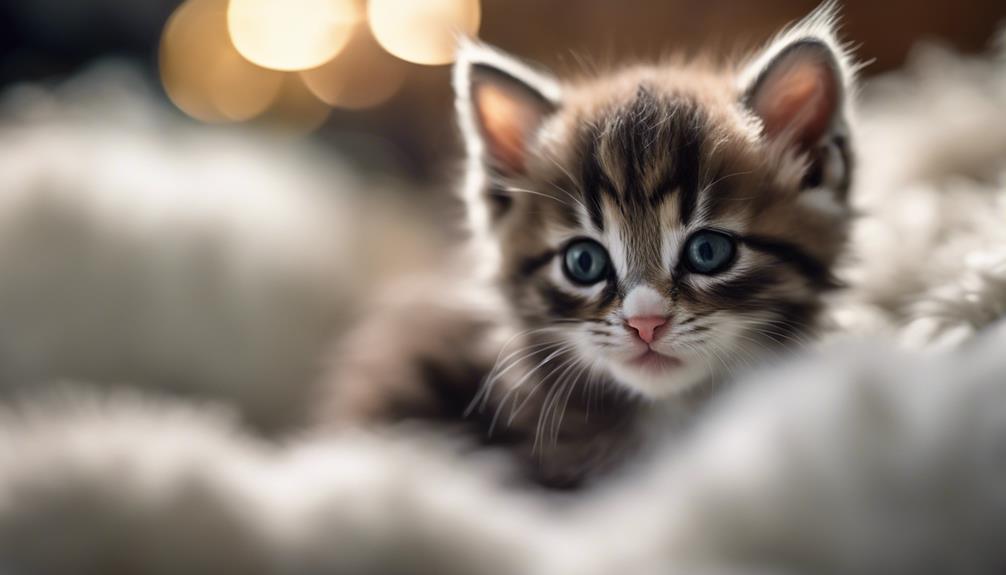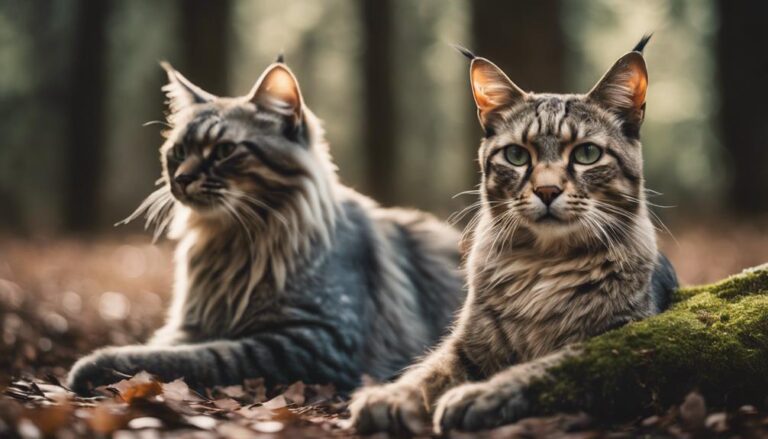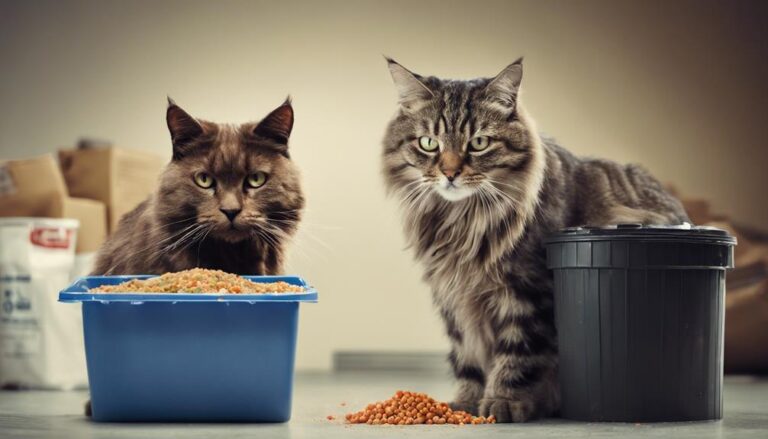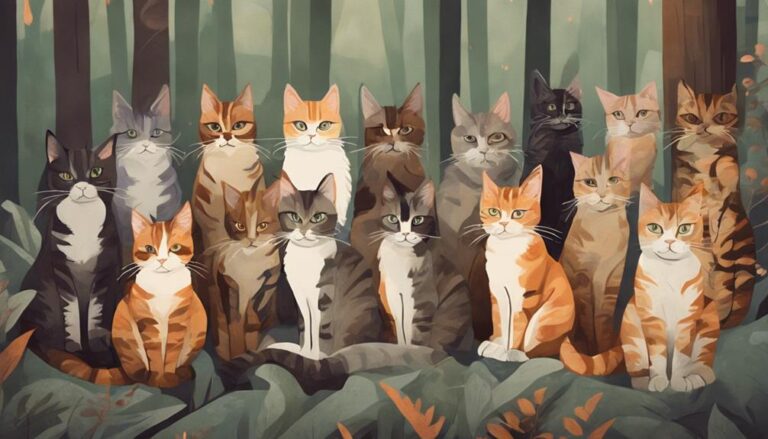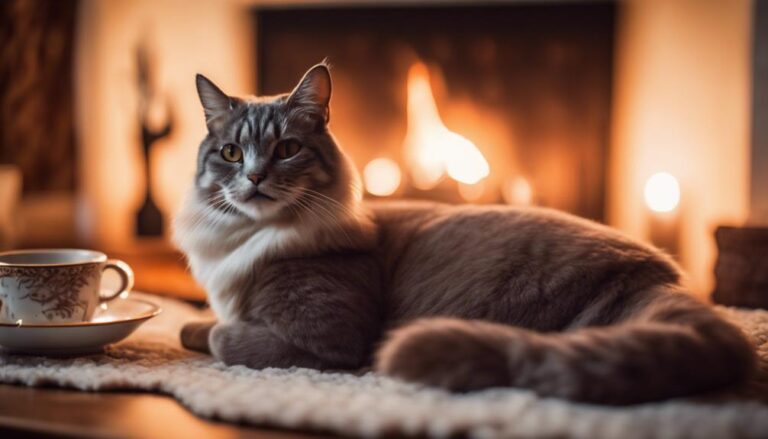You've probably come across a Maine Coon kitten with an unusual, washed-out coat color and wondered what's going on. You're not alone – many breeders and owners have encountered this phenomenon, known as a fever coat. It's a temporary condition that affects the kitten's coat pigmentation, resulting in pale or patchy areas. But here's the question: can Maine Coons be born with this condition, and what does it mean for their health and development? The answers might surprise you, and there's more to uncover about this fascinating aspect of feline development.
Understanding Fever Coat
When you notice a sudden change in your horse's coat, with dullness, unevenness, or a reddish tint, you're likely looking at a fever coat. This condition can be alarming, but vital to understand what it is and what it's not. A fever coat is a temporary change in your horse's coat that can occur due to stress, illness, or environmental factors. It's not a disease or a genetic condition, and it's not exclusive to horses – even kitten-like breeds like the Maine Coon can exhibit similar coat changes. The good news is that a fever coat is usually reversible, and your horse's coat will return to its normal state once the underlying cause is addressed. As a responsible horse owner, key to monitor your horse's coat and overall health, seeking veterinary care if you notice any unusual changes. By staying vigilant and proactive, you can help your horse thrive and maintain a healthy, shiny coat.
Causes of Fever Coat Condition
As you explore the causes of fever coat condition, you'll want to ponder how your mare's health during pregnancy impacts her foal's coat. You'll also need to think about the stress your mare experienced during pregnancy and how that stress affects the development of the foal's coat. By examining these factors, you'll better understand why your foal has developed a fever coat.
Maternal Health Impact
Your mare's overall health during pregnancy plays a significant role in the development of a fever coat condition in her foal, with maternal stress and illness increasing the likelihood of this coat abnormality. As a responsible breeder, making certain to guarantee your pregnant mother cat receives proper care is crucial to minimize the risk of fever coat.
Maternal health issues can contribute to the development of a fever coat in several ways:
- Prolonged stress: Chronic stress can weaken the mother's immune system, making her more susceptible to health conditions that can affect her kitten's coat development.
- Underlying health conditions: Pre-existing health issues, such as diabetes or hypertension, can impact the mother's ability to provide ideal nutrients to her kittens, leading to a fever coat.
- Poor nutrition: A diet lacking essential nutrients can compromise the mother's health, increasing the likelihood of a fever coat in her kittens.
Pregnancy Stress Effects
You'll want to pay close attention to your mare's stress levels during pregnancy, as maternal stress can substantially impact the development of a fever coat in her foal. As a responsible breeder, recognizing that stress, whether physical or emotional, can affect the mother cat's health and, in turn, influence the kitten's coat pattern is vital. When a mother cat experiences stress during pregnancy, it can trigger a fever, which may alter the developing pigment of the kitten's fur, resulting in a fever coat.
It's vital to minimize stress and maintain a healthy environment for your pregnant mother cat. This includes providing a comfortable living space, a balanced diet, and regular veterinary check-ups. By doing so, you can reduce the likelihood of stress-induced fever coat in your kitten. Remember, the mother's health during pregnancy plays a significant role in the development of a fever coat. By prioritizing her well-being, you can increase the chances of having a healthy kitten with a normal coat pattern.
Fever Timing Importance
Timing is pivotal when it comes to fever-induced coat pattern changes, since the exact moment the mother cat's fever occurs during pregnancy determines the extent of the fever coat condition in her kitten. You might wonder why this timing is so vital. The answer lies in the development of the kitten's coat pattern.
When the mother cat's body temperature rises due to fever, it affects the production of melanin, the pigment responsible for coat color. The timing of this fever determines which part of the coat pattern is affected.
- Early pregnancy fever: A fever early in pregnancy can affect the entire coat pattern, resulting in a more severe fever coat condition.
- Mid-pregnancy fever: A fever during the middle stages of pregnancy can cause a mix of normal and fever-induced coat patterns.
- Late pregnancy fever: A fever close to birth may only affect a small portion of the kitten's coat, resulting in a milder fever coat condition.
Characteristics of Fever Coat Kittens
Fever coat kittens typically exhibit a range of distinct characteristics that set them apart from their littermates and other kittens. When you look at a fever coat kitten, you'll notice that their coat has a unique appearance. The kittens' coat often has patches or areas with reduced or absent coat pigment, giving it a pale or washed-out look. This is because the stress of being in the womb triggered a change in the production of coat pigment, resulting in the characteristic patches. You may also observe that the patches can be more pronounced on the face, legs, or belly. In some cases, the entire coat may appear lighter or more muted than usual. Crucial to keep in mind is that the fever coat is not a breed or a genetic trait, but rather a temporary condition that can affect kittens from any breed. As the kitten grows and develops, the fever coat will eventually fade, and their adult coat will emerge.
Fever Coat in Maine Coon Breeds
Maine Coon breeders and enthusiasts often encounter fever coat kittens, which can exhibit a range of characteristics that set them apart from their littermates. As a breeder or owner, you might be wondering if fever coat is unique to Maine Coon cats or if it affects their health. Rest assured, fever coat can occur in any breed, including Maine Coon kittens, and is not a genetic disorder.
Here are three key things to keep in mind about fever coat in Maine Coon breeds:
- Fever coat doesn't affect health or temperament: The temporary silver or grey coloration of a fever coat does not impact the kitten's health, personality, or adult coat pattern.
- Fever coat is not a breeding defect: Fever coat is not a fault in breeding, and kittens born with it can grow into healthy, well-coated adults with proper care and nutrition.
- Fever coat is caused by maternal factors: Maternal illness or stress during pregnancy can cause fever coat in Maine Coon kittens, just like in other breeds.
How Long Does Fever Coat Last
As you wait for your kitten's coat to change, you're probably wondering when the fever coat will give way to its natural color. The answer is, it's hard to predict exactly how long fever coat lasts, as it varies from kitten to kitten. Generally, fever coats can disappear anywhere from 1 month to 9 months after birth, with most kittens shedding their fever coat around 4-8 months old.
During this time, your kitten's coat may change colors, but don't worry, it'll eventually settle into its natural color. The genes for your kitten's natural coat color are already present in its DNA, and the progression of the coat changes can be seen over time. The fever coat will eventually fade, and your kitten will have its natural coat color.
It's essential to remember that every kitten is different, and the rate at which the fever coat changes can vary substantially. So, be patient and enjoy the journey of watching your kitten's coat transform into its natural beauty. With time, you'll see your kitten's natural color shine through, and it'll be worth the wait.
Misconceptions About Fever Coat Health
Many misconceptions surround the health implications of fever coat, but it's reassuring to know that this temporary condition has no bearing on your kitten's overall health. You might have heard that fever coat is a sign of underlying health issues or genetic disorders, but that's simply not the case. In reality, fever coat is a cosmetic condition that doesn't affect your cat's health or well-being in any way.
Here are a few key things to keep in mind:
- Fever coat doesn't predict future health problems: Your kitten's risk of developing health issues later in life is not increased by having a fever coat.
- It's not contagious: You don't have to worry about your kitten infecting other pets or animals in the household.
- It's purely cosmetic: Fever coat only affects the appearance of your kitten's coat, not their temperament, behavior, or overall health.
Rest assured, your kitten's fever coat will resolve on its own as they grow and develop, without requiring any special care or treatment. So, sit back, relax, and enjoy your kitten's adorable (albeit temporary) coat color!
Frequently Asked Questions
Do Kittens Grow Out of a Fever Coat?
You're wondering if kittens grow out of a fever coat? Yes, they do! Typically, it lasts 4-8 months, and as they mature, their natural coat color replaces the frosted appearance, revealing their true color and pattern.
What Is a Fever Coat on a Newborn Kitten?
You might've noticed your newborn kitten's dull, flat coat – that's a fever coat! It's a temporary, stress-related condition causing their fur to look unhealthy, but don't worry, it'll fade as they grow and thrive.
What Disease Is Inherited in Maine Coons?
You're wondering what disease is inherited in Maine Coons? You'll want to know that spinal muscular atrophy, a genetic disorder, is commonly inherited in this breed, affecting their muscle tone and coordination, and can be diagnosed through DNA testing.
Do Maine Coons Have Two Coats?
You're wondering if Maine Coons have two coats, and the answer is yes, they do! They have a thick undercoat and a longer, coarser guard hair layer that provides insulation and protection from the elements.

